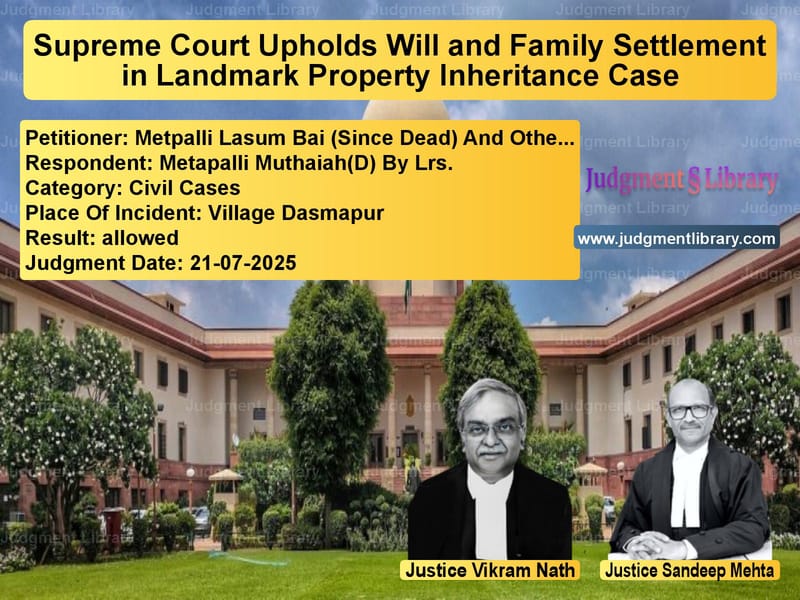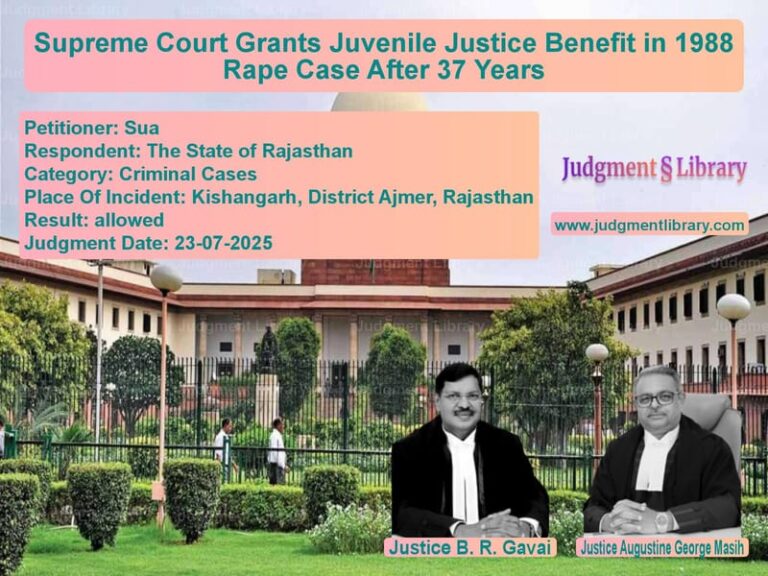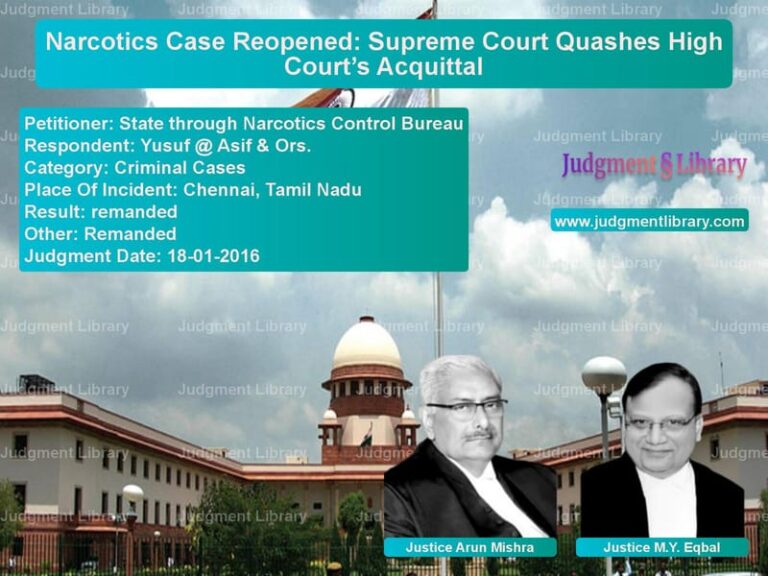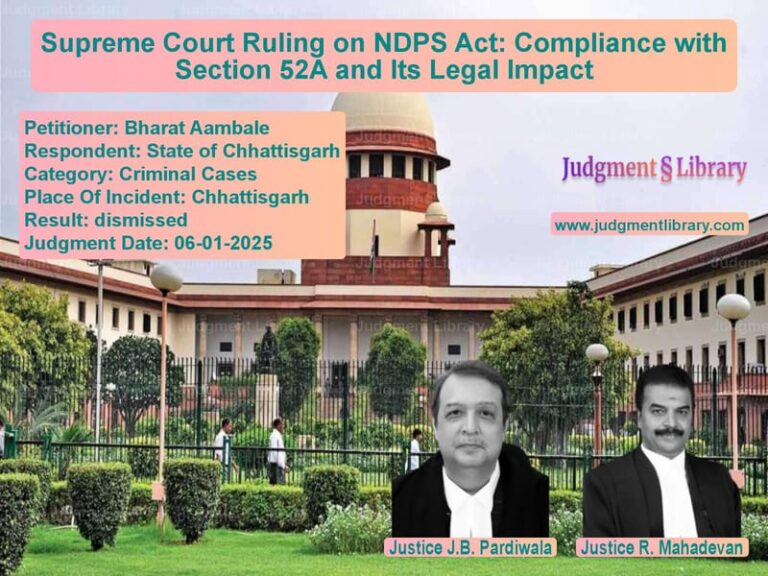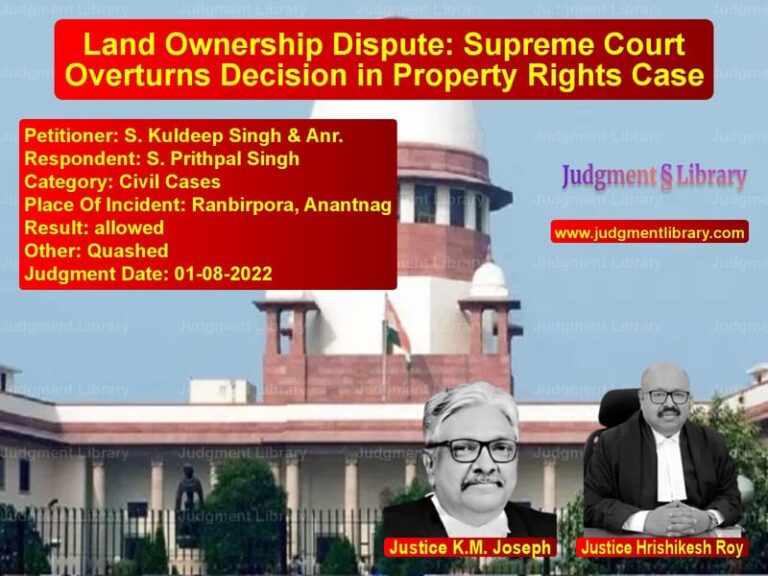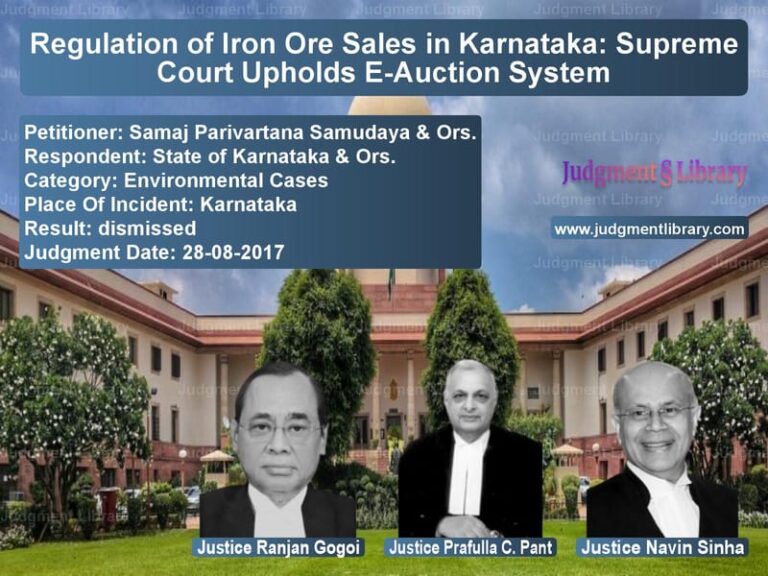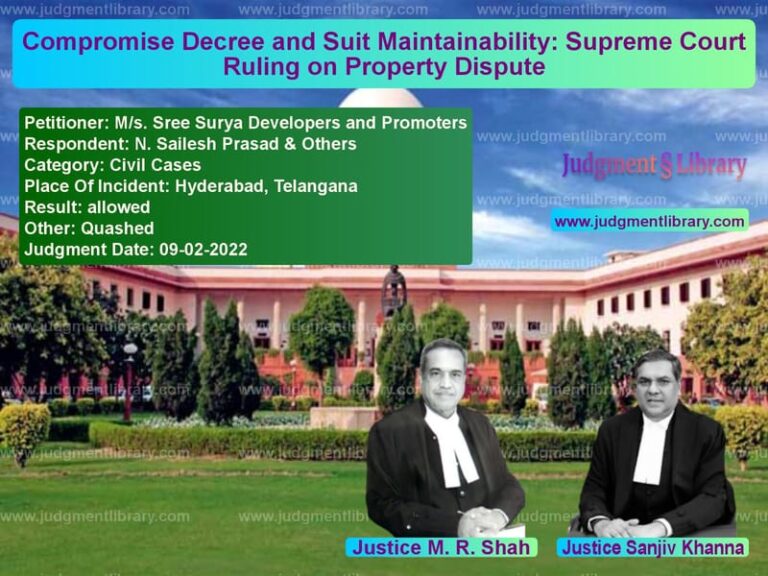Supreme Court Upholds Will and Family Settlement in Landmark Property Inheritance Case
In a significant judgment that clarifies the legal standing of registered wills and family settlements in property disputes, the Supreme Court of India delivered a landmark verdict on July 21, 2025, restoring the rights of a widow over ancestral property that had been contested for decades. The case involving Metpalli Lasum Bai and her stepson Metpalli Muthaiah represents a classic family dispute over inheritance that traveled through multiple courts over several years, finally reaching resolution at the nation’s highest judicial forum.
The dispute centered around a substantial chunk of land measuring 4 acres and 16 guntas located at village Dasmapur, which was part of a larger property portfolio originally owned by Metpalli Ramanna. The genealogical history revealed that Ramanna died intestate before 1949, leaving behind significant land holdings totaling 18 acres and 6 guntas across multiple villages. His son, Metpalli Rajanna, inherited these properties and married twice – first to Narsamma, with whom he had two children, Muthaiah and Rajamma, and after Narsamma’s death, to Lasum Bai, who bore no children.
The crux of the dispute emerged after Rajanna’s death in 1983. Lasum Bai claimed that her late husband, anticipating potential conflicts between her and his son from the first marriage, had made an oral family arrangement distributing his properties among his wife and children. According to her claim, the distribution gave Lasum Bai 6 acres 16 guntas from Survey No. 28 of Dasnapur Village, a similar portion to Muthaiah, and specific shares to Rajamma, their widowed daughter. Crucially, Rajanna had also executed a registered will on July 24, 1974, recognizing this distribution.
The legal battle intensified when Lasum Bai sold two acres of her purported share to Sanjeeva Reddy through a registered sale deed on August 27, 1987, and entered into an agreement to sell the remaining 4 acres 16 guntas to Janardhan Reddy. This triggered Muthaiah to file an injunction suit, which was decreed in his favor, though the court specifically noted that it was not examining the title question and that Lasum Bai was free to file a separate suit for declaration of title.
Lasum Bai accordingly filed Original Suit No. 2 of 1991 for declaration of her title over the suit schedule properties. The trial court, after thorough examination of evidence, decreed the suit in her favor on November 15, 1994. The court made two crucial findings: first, that Lasum Bai had established that Rajanna executed the will in a sound disposing state of mind, and second, that the admissions made by Muthaiah in his evidence confirmed the existence of the family arrangement and separate possession of respective portions.
Muthaiah appealed to the High Court, which partially allowed his appeal on January 23, 2014. The High Court set aside the trial court’s judgment and held that Muthaiah was entitled to a 3/4th share while Lasum Bai could claim only 1/4th share in the suit schedule properties. This reduction of Lasum Bai’s share prompted the appeals to the Supreme Court.
Before the Supreme Court, the appellants, represented by senior counsel Mr. Gaurav Agarwal, made several compelling arguments. They contended that “even going by the genealogy of the parties and assuming that the Will (Ext.-A1) was not in existence, the plaintiff-Lasum Bai would get 1/3rd share of the properties owned by M. Rajanna which would be much more than the area of the disputed property.” They further argued that “the registered Will (Ext.-A1) has been proved by leading unimpeachable evidence. The defendant-Muthaiah admitted the signatures of M. Rajanna on the Will and thus, undeniably the plaintiff-Lasum Bai inherited the suit schedule property under the said Will.”
The appellants also emphasized the significance of Muthaiah’s failure to challenge the earlier sale made by Lasum Bai, stating “The plaintiff sold 2 acres out of her share of 6 acres and 16 guntas land in the village Dasnapur to Sanjeeva Reddy by a registered sale deed dated 27th August, 1987. The said sale deed though very much in knowledge of the defendant-Muthaiah, was never challenged before any forum. Hence, apparently, defendant-Muthaiah has acquiesced to the right of plaintiff-Lasum Bai over the suit schedule properties.”
The respondents, representing Muthaiah’s legal heirs, countered these arguments vehemently. They contended that “the unpartitioned land was owned by Ramanna who expired before 1949. Thus, all properties owned by Ramanna upon his death devolved in equal shares upon M. Rajanna and defendant-Muthaiah being the two male co-parceners.” They further argued that “the registered Will which was executed by M. Rajanna in favour of plaintiff-Lasum Bai, defendant-Muthaiah and Rajamma has no sanctity in the eyes of law because the said Will was executed by M. Rajanna in the capacity of the owner of the entire land in question whereas the fact remains that the land was not the self-acquired property of the testator i.e., M. Rajanna.”
The Supreme Court, in its judgment delivered by Justice Mehta, conducted a comprehensive analysis of the evidence and legal principles. The Court placed significant emphasis on the admissions made by Muthaiah in his deposition, particularly noting that “My father allowed me to cultivate half of the land on the Southern side. My father asked her to cultivate 4 guntas of land in Mavala and asked me to cultivate 6 guntas in Mavala. My father made this arrangement on the date of his death (Arrangement relating to my cultivation on the Southern side and the plaintiff on the Northern side in Mavala village).” These admissions, the Court found, substantially supported Lasum Bai’s claim about the family arrangement.
The Court also highlighted Muthaiah’s acknowledgment of Lasum Bai’s sale of two acres to Sanjeeva Reddy, where he stated “It is true that plaintiff sold 2 acres of land in Northern portion of Dasnapur land to one P. Sanjeeva Reddy under registered sale deed. Those 2 acres of land is in possession of Sanjeeva Reddy even before I filed the suit.” This admission, coupled with his failure to challenge that sale, significantly weakened his position.
The Supreme Court’s analysis of the registered will proved crucial to its decision. The Court noted that “The Will is a registered document. The defendant-Muthaiah in his evidence, admitted the signatures as appearing on the said Will (Ext.-A1) to be that of his father, i.e., M. Rajanna.” The Court emphasized the legal presumption favoring registered wills, stating “The Will, is a registered document and thus there is a presumption regarding genuineness thereof. The trial Court accepted the execution of the Will based on the evidence led before it. As the Will is a registered document, the burden would lie on the party who disputed its existence thereof, who would be defendant-Muthaiah in this case, to establish that it was not executed in the manner as alleged or that there were suspicious circumstances which made the same doubtful.”
The Court found Muthaiah’s failure to discharge this burden decisive, particularly since he had admitted his father’s signatures on the document. The judgment further noted that “The genuineness of the Will is also beyond doubt because it not only confers the right and title over a part of the land owned by the Testator, M. Rajanna to the plaintiff-Lasum Bai, but it also grants a lion’s share of the property to the defendant-Muthaiah. Had it been the intention of M. Rajanna to deprive the defendant-Muthaiah of the land or if the Will had been manipulated, then the defendant-Muthaiah could have been left out completely from gaining any benefits under the Will.”
The Supreme Court also addressed the High Court’s approach, expressing firm disagreement with its interference in the trial court’s well-reasoned judgment. The Court held that “The High Court, manifestly erred while interfering with the well-reasoned judgment of the trial Court and substituting its own findings by reducing the share of plaintiff-Lasum Bai in the suit schedule properties.”
In its final ruling, the Supreme Court allowed the appeal filed by Lasum Bai’s representatives and dismissed the cross-appeal by Muthaiah’s legal heirs. The Court restored the trial court’s judgment and decree dated November 15, 1994, thereby declaring Lasum Bai as the true owner with exclusive title over the suit schedule properties, including the disputed 4 acres 16 guntas that she had sold to Janardhan Reddy.
This judgment reinforces several important legal principles in inheritance law. It underscores the evidentiary value of registered wills and the burden of proof on those challenging them. The decision also highlights the significance of admissions made in witness testimony and the importance of contemporaneous conduct, such as the failure to challenge earlier transactions, in determining the validity of claims. Furthermore, the judgment affirms the rights of widows in ancestral property disputes and recognizes the validity of family arrangements made to prevent future conflicts.
The Supreme Court’s decision brings closure to a long-standing family dispute that had persisted for decades, providing clarity on the interpretation of wills and family settlements in the context of Hindu inheritance law. The ruling serves as an important precedent for similar cases where registered documents and oral family arrangements form the basis of property claims, ensuring that the intentions of testators are respected and implemented according to law.
Petitioner Name: Metpalli Lasum Bai (Since Dead) And Others.Respondent Name: Metapalli Muthaiah(D) By Lrs..Judgment By: Justice Vikram Nath, Justice Sandeep Mehta.Place Of Incident: Village Dasmapur.Judgment Date: 21-07-2025.Result: allowed.
Don’t miss out on the full details! Download the complete judgment in PDF format below and gain valuable insights instantly!
Download Judgment: metpalli-lasum-bai-(-vs-metapalli-muthaiah(d-supreme-court-of-india-judgment-dated-21-07-2025.pdf
Directly Download Judgment: Directly download this Judgment
See all petitions in Succession and Wills
See all petitions in Property Disputes
See all petitions in Contract Disputes
See all petitions in Specific Performance
See all petitions in Damages and Compensation
See all petitions in Judgment by Vikram Nath
See all petitions in Judgment by Sandeep Mehta
See all petitions in allowed
See all petitions in supreme court of India judgments July 2025
See all petitions in 2025 judgments
See all posts in Civil Cases Category
See all allowed petitions in Civil Cases Category
See all Dismissed petitions in Civil Cases Category
See all partially allowed petitions in Civil Cases Category

